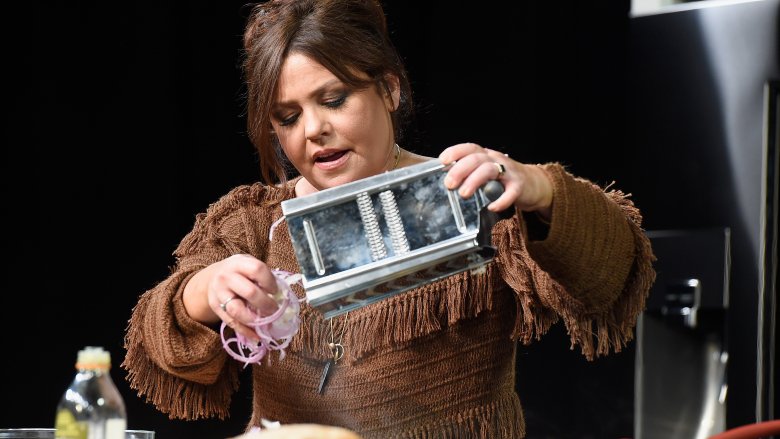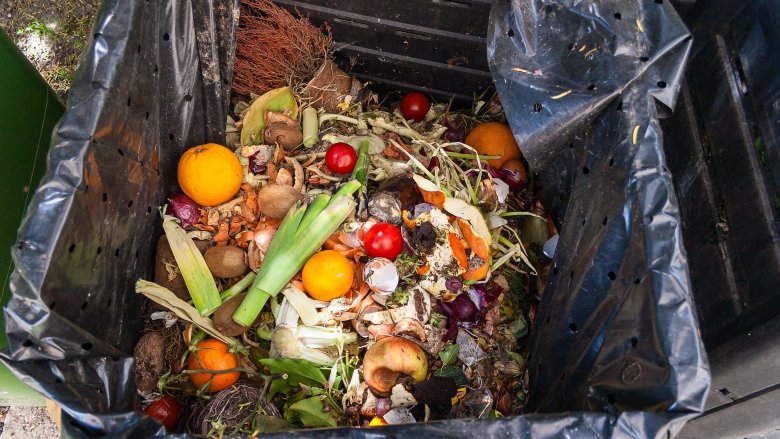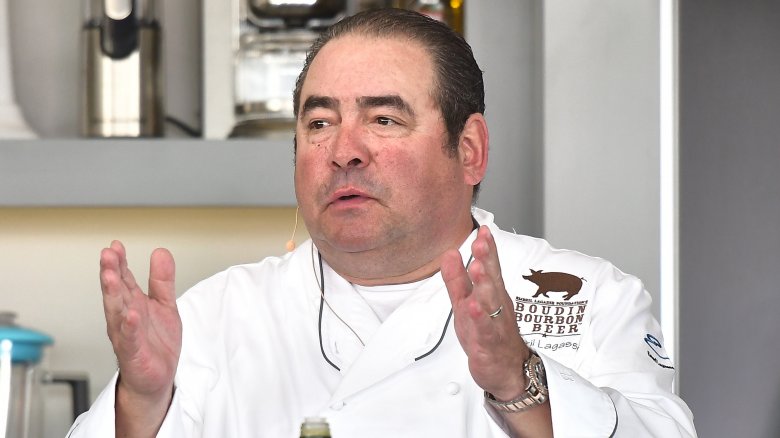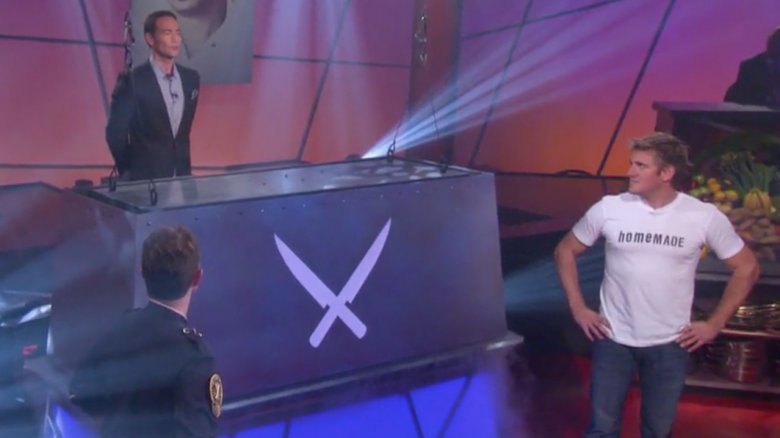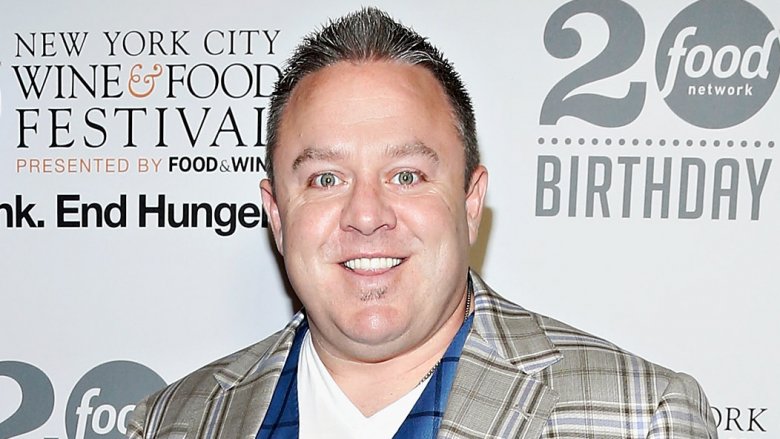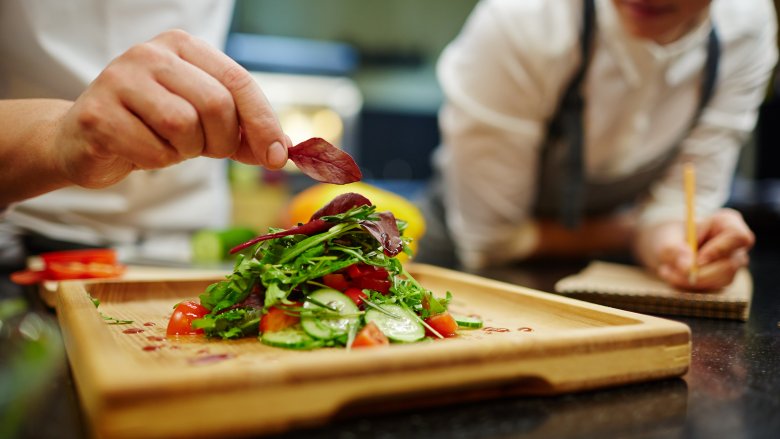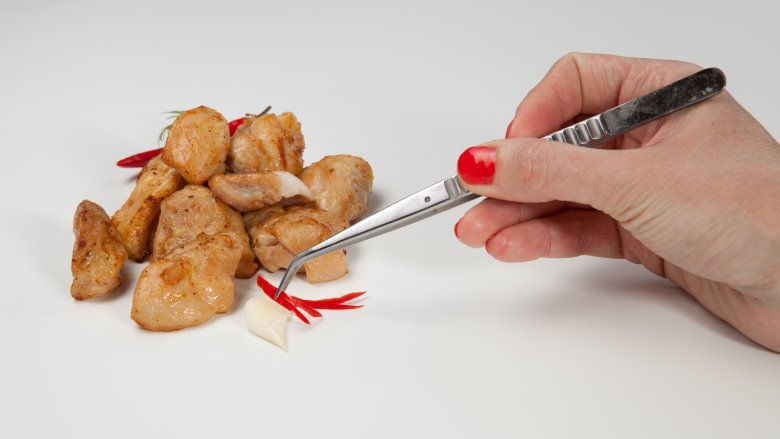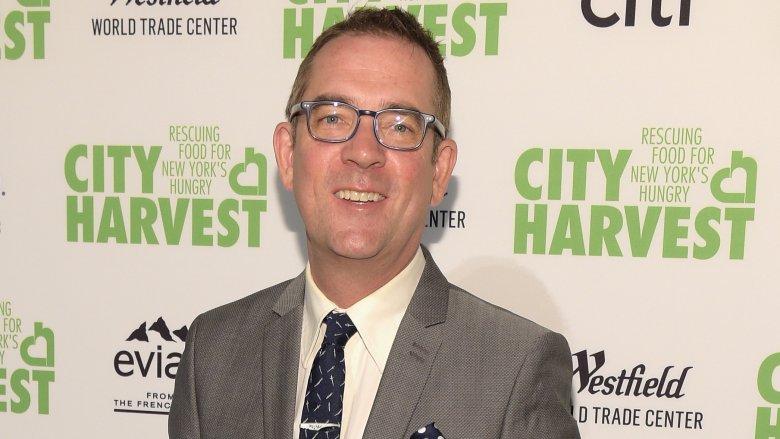Reasons Why Food Network Shows Are Totally Fake
Since the early '90s, Food Network has been educating us, entertaining us, and indulging our deep carnal desire to watch food get prepared, cooked, and eaten. They even have a hit show that's just chefs sitting around talking about great meals they've personally eaten. And although numerous stars got their start making deliciously unhealthy, semi-homemade meals in 30 minutes or less on the cable stalwart, things on the screen aren't always what they seem.
For example, did you know that Iron Chef contestants aren't really surprised by the "secret ingredient?" Or how about Everyday Italian host Giada de Laurentiis' alleged practice of spitting food into a "dump bucket in between takes in order to maintain her enviable figure? Yep, it turns out there's some pretty shady prep work going on in order to crank out these popular culinary shows.
Here's a not-so-sweet (or savory) look into why Food Network shows are totally fake.
Gross with a side of yuck
At the heart of any cooking show is, well, cooking. A TV chef makes a delicious dish just like they would in a restaurant or at home, right? Let's hope it's not entirely like that because according to one study of television cooking shows, that food personality is committing all sorts of crimes against health.
Over the course of two weeks, researchers for Texas Tech University's International Center for Food Industry Excellence (via the Daily Blender) watched 49 Food Network shows (nice work if you can get it,) including 30 Minute Meals with Rachael Ray, The Essence of Emeril, Everyday Italian, and Semi-Homemade Cooking with Sandra Lee, and noted an astounding 460 "poor food-handling incidents." That included not using thermometers, using food that fell on the floor, not washing produce, not washing cooking tools properly, and even licking fingers.
There's a dirty secret in their trash bins
Fortunately, a lot of that dirty food goes straight into the garbage instead of into somebody's mouth. On an Ask Reddit thread about cooking show secrets, a user named "jaspersgirl411" claimed to have witnessed first-hand a tremendous amount of trashed treats. "I worked on a cake decorating show for a season and every day we had to throw out the 3 50lb cakes that the contestants had just spent the last 8 hours decorating."
Why not just let the crew eat it, or donate it to the less fortunate?
"They were sitting under the studio lights for so long they were no longer safe to eat so we couldn't give them away."
Could Emeril not afford coffee for the crew?
Food Network transformed low-key, instructional cooking shows into mainstream television entertainment. Its chefs even use catchphrases just like sitcom stars. Ina Garten has "How easy is that?" Emeril Lagasse has "BAM!," which has become such a natural utterance that it seems like something the New Orleans-style chef must have been screaming for years in his kitchens.
Alas, his signature word came out of an early Food Network taping in the '90s. According to an interview with Eater, Lagasse said that due to his normal working schedule, he had to shoot "eight shows a day," which was an understandably taxing task for the studio's camera operators. As such, they'd often fall asleep while Lagasse cooked on camera. To wake them up, Lagasse started yelling "BAM!" when adding ingredients to a dish.
Taking 'mouth feel' to a whole other level
Working as a TV chef is one of the few jobs that involves the slow, steady ingestion of hundreds of extra calories. Think about it: a food personality has to taste a dish at every step of the cooking process and then take a big bite at the end for the audience watching at home. It has to be a real struggle to keep one's figure in such a strenuous work environment.
Food Network's Giada de Laurentiis reportedly keeps those calories out of her body by literally ejecting them out of her body. According to a de Laurentiis employee who spoke to Page Six, de Laurentiis uses a "dump bucket that is brought out the second they cut." She just spits out the food— easy as that.
Iron Chef is bad at keeping secrets
Iron Chef and Iron Chef America are two of the funnest game shows on TV. (Yes, they're game shows.) The drama in Kitchen Stadium kicks into high gear when the Chairman unveils the "secret ingredient" the battling chefs must use as the central component of their dishes on each episode — lamb, tilapia, spiny lobster, etc.
But did you know that element is strictly for the sake of fun TV? According to Today, the chefs reportedly have a pretty good idea about the "secret" ingredient by the time cameras start to roll. They're even given a short list of possibilities a few days before filming, and on taping day, they can guess which one producers probably picked based on the list of complementary ingredients purchased for the show.
Food reality shows are still reality shows
Beyond cooking shows, Food Network airs a wide variety of food-based reality programming, some of which isn't quite as "real" as promised.
The 2012 series Restaurant Stakeout featured restaurateur Willie Degel observing an eatery's staff to identity and fix major problems. Lucia Ivezaj, the owner of the Mount Ivy Cafe, which was featured on the series, reportedly alleged the show was quite staged. Because the place didn't have enough natural "drama," he claims the show hired a guy to pose as a waiter who dropped food and drank on the job, just so he could get fired. The staff also allegedly had to change clothes throughout taping so it would look like the show had filmed over the course of several days.
Can I borrow a cup of original recipes?
Food Network personalities are extremely busy. For many, the reason they have a show (or shows) in the first place is because they've already had successful careers as chefs or restaurateurs. To find the time to make a bunch of episodes of a TV show, these chefs often need a little help.
That's where ghostwriters come into play. According to Bon Appétit, TV chefs from the Food Network and other outlets, don't write every recipe for every episode. Instead, they reportedly rely on outside parties to formulate ideas. A talented cook can get a lucrative sideline going helping the more visible and telegenic chefs. A cookbook writer named JJ Goode, for example, has helped out on a dozen books, including one by Iron Chef's Mosaharu Morimoto.
The real culinary magic happens backstage
The food that the TV chef prepares isn't the only cooking that takes place during the show. Off-camera, other people are cooking one or more versions of the same recipe, according to the Tribune-Review. It's expensive and time-consuming to shoot an episode of a cooking show, so preparing backup plates is an insurance policy should the star burn, overcook, or otherwise mess up the main dish. Off-screen helper cooks prepare the dish at different stages of the process to show viewers what it's supposed to look like, without having to wait around for the televised food to cook.
Food stylists do a lot of the heavy lifting
A meal prepared at home from a recipe obtained from a Food Network show may not turn out looking just like it did on TV, and that's because you probably don't have a food stylist or two on hand like Food Network personalities do.
According to LA Weekly, it's the chef's job to cook, and it's the stylist's job to make it look perfect for TV. That means making sure it doesn't melt, wilt, or sag under those hot studio lights. A couple tricks of the trade: food stylists keep things in place with toothpicks and place marbles in soup so the ingredients are forced to float to the top.
Nobody gets Chopped for cold food
Chopped is one of the Food Network's most popular and compelling shows. Real chefs compete to make dishes based on a basket of seemingly random ingredients, and they're judged by a panel of food experts. After all that effort of cooking, plating, and carting dishes over to the judges, it would seem like the contestants' creations would get cold.
It does, which is why Chopped judges get to sample the food before it's finished. According to host Ted Allen, "the minute we cut after a cooking round, the judges get up from the Chopping Block, and they go over to the stations and they taste things that are hot. You can't mess up the plates, but you can taste to see whether something is crispy, whether something is cooked through, taste the sauce before it has congealed or anything."

